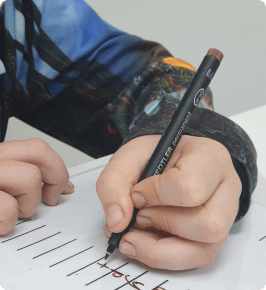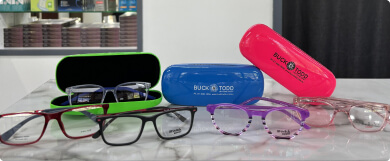Children’s Vision
At Buck and Todd Optometrists, our commitment to children’s vision extends beyond routine eye exams. Our comprehensive assessments for young patients include a thorough evaluation of eye health, mirroring the same level of care provided to adults. Additionally, we conduct in-depth binocular vision assessments, examining the child’s ability to maintain accurate eye alignment while reading across a board or page, transitioning between distances, and sustaining focus over time. Moreover, we meticulously assess reading speeds, reading methods, eye tracking, and various facets of dyslexia, such as dyseidesia (whole word awareness), dysphonesia (phonetic decoding and encoding), and dysnemkinesia (reversals), among others. Our specialised behavioural optometry service delves into the intricate relationship between visual information processing and attention, as well as its impact on learning.
We are deeply committed to meeting the holistic vision needs of our young patients, ensuring that any visual obstacles they face do not hinder their academic or developmental journey. Our vision care philosophy extends beyond mere eyesight, aiming to optimise visual function across all facets of life, including education, sports, and leisure activities. We firmly believe that vision encompasses more than just achieving “20/20” clarity. True visual wellness involves the seamless processing of sensory inputs, integration with previous memories, and the ability to respond appropriately. Our goal is to empower individuals with the tools they need to navigate the world comfortably and confidently, fostering a lifetime of enriched experiences and achievements.
To ensure comprehensive care, we schedule two appointments for your child. In the first appointment, our optometrist conducts a comprehensive evaluation covering eye health, body control, binocular function, colour vision, stereopsis, and auditory processing. During the second appointment, our vision therapist assesses your child’s visual perception skills, age-related word awareness (both eidetic and phonetic), eye movement control (simulating reading speeds and accuracy), pen grip, letter formation, visual-motor skills, laterality, mid-line issues, and other visual processing skills. All findings from these evaluations are meticulously reviewed and compiled into a detailed final report. This report is then shared with the family, as well as any health professionals or teachers designated by the parents. Parents have the opportunity to schedule a results discussion appointment with the optometrist to address any questions regarding the findings outlined in the report, as well as to explore recommended interventions aimed at supporting their child’s vision and development.

Who may benefit from Behavioural Optometry?
Patients of all ages would benefit from a more in depth approach but particularly those between the ages of 6 and 17 who suffer visual fatigue and vision stress, those with eye motor control problems, lazy eyes, developmental delays, neurological damage or learning delays.
Whilst the visual system in adults is less adaptive to learning/ change, behavioural optometry may be suitable for adults if their condition is considered by the optometrist to be amenable with this treatment.
How is a Behavioural Optometrist different?
Behavioural optometrists complete post-graduate education to further their knowledge in programs that can prevent or eliminate visual problems and enhance visual performance. Working alongside our vision therapist we endeavour to help all facets of vision processing rather than just visual acuity.
Not all optometrists practice behavioural optometry, but those who do implement neuro-developmental and functional optometry.

